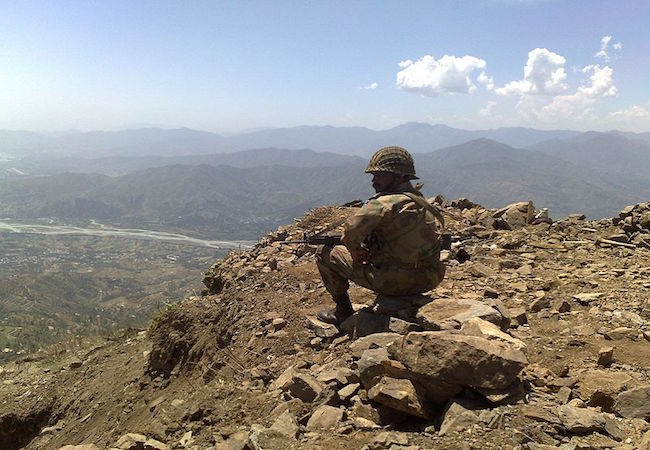
By Sadia Kazmi
It is in the wake of new terror wave in Pakistan that a renewed zeal to root out terrorism in all its form erupted once gain. Although it was only recently that the military leadership had completed Zarb-e-Azb, the horrifying series of attacks across Pakistan in the month of February led to the launch of Radd-u-Fasaad. While many can be found questioning the feasibility of such a measure, the positive aspect is that it’s a collaborative action mutually taken by the civil and military leadership. This factor alone can bring in some hope to the mortified population of Pakistan that tends to suffer the most. Most of the efforts are believed to have been counterproductive so far since the military and civil leadership had fundamentally been on different pages. No doubt verbally the conviction from civil side was visible but when it comes to taking practical action, the resolve was largely missing. Various factors could be held responsible for that such as lack of institutional capacity. Lack of leadership acumen or may be just simple the lack of commitment to the cause.
However operation Raad-ul-Fasaad is a wave of hope where the mutual efforts are being utilized to root out terrorism indiscriminately. The measure was taken after the bombing incident in Sehan Shareef which led to a great number of civil causalities. The timely action is highly commendable in this regard. The continued resolve and commitment is essential for the successful culmination of this operation, the effectiveness of which depends on a number of factors. The Operation Radd-ul-Fassad is not just a clean sweep military action against the terrorist elements but should be seen as an effort that should have long lasting and durable implications. This is only possible if along with the military action, the terrorist mind set is targeted. Killing a few people will not completely root out the strongly deep rooted menace of terrorism in the society. The people should be made useful by providing educational and employment opportunities. One of the main reasons for the growth of terrorism in this region is the explosive increase in population and dearth of employment. The two pronged strategy should be to curb population increase and proper deployment of the people. Along with that the civil leadership needs to be clearer in its approach towards the banned religious organizations. It needs to understand that the policy of pick and chose is not going to work anymore. Hence a more objective and sincere commitment is required if the writ of the state is to be established.
While operation Raad-ul-Fasad is being seen as the continuation of National Action Plan, mainly targeting the rogue elements within the country, it was primarily launched after a series of attacks in Sehwan Shareef carried out by Jamaat-ul-Ahrar under the banner of operation Ghazi. It is an Afghanistan based jammat that has also announced the possibility of it forging an alliance with Tehrik-e-Taliban Pakistan splinter groups. Despite Pakistan’s
demand for the arrest of TTP chief Mullah Fazllullah who is based in Afghanistan, no concrete steps have been taken by Afghanistan in this regard. The only option left to Pakistan was to target the training camps along the Pak-Afghan border. Even though Afghanistan raises voices against terrorism and leaves no stone unturned in implicating and blaming Pakistan in any event of terrorism in Pakistan, ironically when the terrorists hideouts and training camps were targeted, there was a ready reaction from Afghanistan under the pretext of Pakistan violating Afghan territorial sovereignty. Also the blockade of border at Chaman and Torkham is being criticized by the Afghan leadership highlighting the everyday economic losses being incurred because of border blockade. If Afghanistan were sincere about acting against terrorism, it would have welcomed and appreciated these both steps by Pakistan. Contrary to that there is a constant demand for the reopening of the border. Afghan ambassador to Islamabad Omar Zakhilwal has demanded authorities to reopen the Torkham border, saying the closure is causing ‘hardships’ for people on both sides. But Pakistan’s ambassador in Afghanistan Syed Abrar categorically and rightly told Afghan authorities that closure of border with Afghanistan was essential in order to stop the movement of terrorists from Afghanistan border. However, Pakistan should also be careful, not to put boots on the foreign territory. It should urge International community to convince Afghanistan to do its job sincerely without showing any sympathy for any group.
Afghan authorities were also given the list of 76 terrorists hiding in Afghanistan to be handed over but no action has been taken in that regard either. Unless Afghanistan takes any practical measures, the border should remain close. Attention should also be given to the process of sending the Afghan refugees back to their country. The process started in 2014, but on the request of Afghan leadership, the refugees have been given the repeated extensions. Unfortunately there is still no proper measures in place to ensure the registration of Afghans residing in Pakistan. This should also be done more accurately. Unfortunately the policy of brotherhood with Afghanis hasn’t worked for Pakistan. Last but not the least, Raad-ul-Fassad and other counter measures against extremist elements will only be effective if no one is exempted under the law and the writ of the state is allowed to establish.




